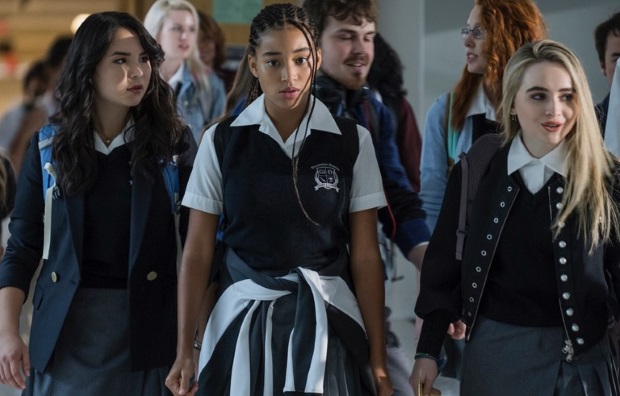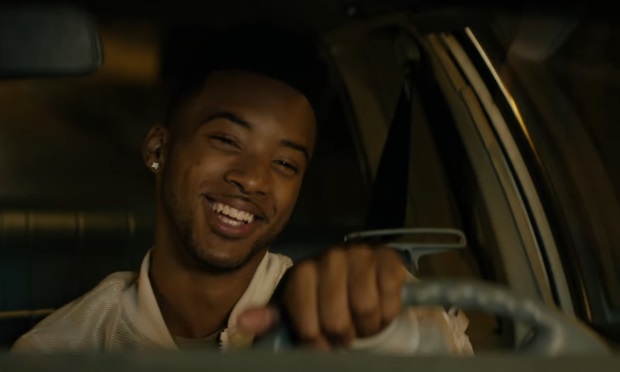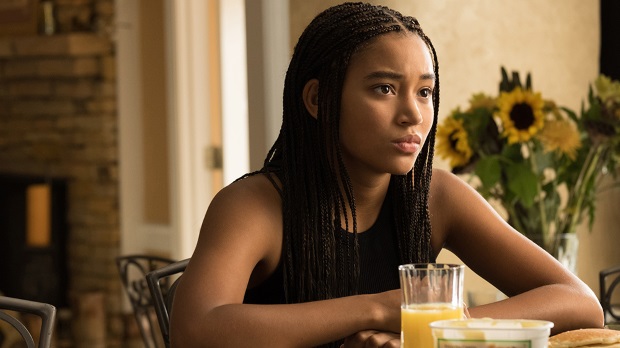The Hate U Give author on empathy, police brutality and Black Lives Matter
“As a writer, I want to be a mix between JK Rowling and Tupac,” Angie Thomas tells Den of Geek...
Angie Thomas’ debut novel The Hate U Give was first published in February 2017 and shot straight to the top of the New York Times bestseller list. No wonder – it’s a furious, political and personal gut punch of a novel, a highly emotional and sophisticated YA drama about a young African-American girl finding her voice after a horrendous act of police brutality.
Now it’s been turned into a movie, starring Amandla Stenberg as the lead character Starr Carter, with Notorious and Faster director George Tillman Jr directing.
Den of Geek sat down with Thomas to talk about the shooting that inspired the book, empowering a new generation and how Harry Potter saved her life.
How did you feel when you first saw the film?
I think I’ve seen it four times now. You know, there’s actually a video reaction of me. I told the social media people “Just come in, and record me. Whatever my initial reaction is – just do it. Just start recording.”
I thought I was going to be standing there, clapping or something. I was sitting there, sobbing.
I mean, I sobbed so hard. It was such a beautiful adaptation of the book. I’m still honoured that it even exists. I’m blown away every single day by it.
The book was a massive phenomenon. At what point did you know it had become this great, big thing?
I think when it really hit me was when the book was still on the list four weeks later [laughs]. And then four months later, it was still there. That just blew me away.
I think when it really hit me, too, was when I came here to the UK, and I met people who had already read it, and they loved it. For it to be such an American story, and to know that it connected with UK readers the way that it did – that was really one of those huge moments for me. So I still can’t believe that.
What sort of responses and reactions have you got from teenagers to the book?
Their reactions are always my favourites. You know, whether it’s the young black girls who say, “Oh my God!” They’ll come up to me and they have to clap: “Oh my God!” You know? And I know what that means. That means they loved it. They’re like [says while clapping]: “This. Is. Me. This. Was. My. Experience. Thank. You.”
Or they’ll say, “I never read a book before this.”
And then you have the young black boys who are like, “Yo, I hate reading, but I read this in a day. This is dope!”
And then it’s the white kids from rural communities who have no black people in their city or their town, who say, “This book opened my eyes. It changed my mind.”
That’s why I do it – for all of those reactions. So to know that I’ve given so many young people something that they can either connect with or see themselves in? That’s an honour. So they’re the reason I do what I do, and I’m going to keep doing it.

Tell us a little bit about what inspired you to write it in the first place?
First of all, I wrote it as a short story when I was in college. I lived in a mostly black, poor neighbourhood, like Starr’s, and I went to a mostly white, upper-class private school, like Starr did. And I had to be two different people in two different worlds.
I would often leave my house, playing Tupac, but by the time I got to school, I was listening to the Jonas brothers, because I thought that’s what I had to do to fit in. And I was careful about how I presented myself. I never wanted anyone to write me off as the ghetto black girl, the angry black girl, or any of those things.
But there was a young man by the name of Oscar Grant who lost his life in Oakland, California. I didn’t know him personally, but I took his death personally. The video showed him lying flat on his stomach, with an officer who had his knee in Oscar’s back. The officer, for some odd reason, shot him in the back. And he was not charged on it. He got away with it.
And that fact led to a lot of riots and protests in Oakland, but it also created conversations in my neighbourhood and at my school. In my neighbourhood, we understood the anger and fear and frustration that the people of Oakland had. But at my school, some of my classmates were like, “Well, maybe he deserved it. He was an ex-con. Why are people so upset? He should have just done what they told him to.”
And I couldn’t wrap my head around the fact that they would try to justify his death the way that they did.
So I wrote a short story to express my own emotions, and to hopefully help them understand. And that short story later became The Hate U Give. It took me a couple of years to decide to write it as a novel, because as a short story, it was hard enough to write, you know? But then when Trayvon Martin happened, and Michael Brown, and Tamir Rice, and I’m hearing politicians justify why it’s OK that a 12-year-old child lost his life – I was so angry and hurt and frustrated.
In the end, the young people in my community were so angry and hurt and frustrated, that I decided to turn the short story into a novel for myself and for them.
So that’s why I wrote The Hate U Give. It was really for them and for me. I was like, “If I can get one of them to read it, I’ve done something.” I’ve gotten all of them to read it now, and I’m still blown away.

That’s amazing. So what do you hope the movie will do?
You know, I hope the movie will help more people understand why we say Black Lives Matter, you know? We’re in an interesting time right now where people are mad at Colin Kaepernick for taking a knee, protesting police violence, and so many of them don’t understand that that’s all he’s trying to do – protest police brutality.
People are trying to boycott Nike because of their support of him. It’s like: are you saying that you’re more in favour of things that advocate the killing of someone like me?
That’s what it feels like. So we’re in an interesting time right now regarding that. So I hope that this movie helps more people understand why we say Black Lives Matter, and why Colin takes a knee. I also hope people walk away deciding to find out what it’s like to be someone who isn’t like them, you know?
A lot of times, people who read the book or watch the movie, if they aren’t like Starr, they say, “Wow, I had no idea that it was like this for black people” or “I had no idea that this was a struggle”.
And now I hope that it makes them decide to find out: “OK, so what it’s like to be someone else who’s not like me?” Because then you become aware of things that you actually have the power to change. So that’s another big hope for me with the film and the book. I hope that people walk away with some empathy.
I’m a firm believer that empathy is more powerful than sympathy, and I hope that we walk away with that, and that we use that empathy to empower ourselves.
Do you see it as Young Adult novel? It’s very grown up material.
I do, I do. The fact of the matter is, young adults are dealing with so many real adult issues, you know? And YA gets a bad rep. People are like, “Oh, it’s just vampires.” It’s so much more! I would honestly say that Young Adult fiction is one of the most progressive forms of publishing right now. The stories that are being told are stories that not even adult fiction dares to tell.
So I have no problem with the book or the movie bearing that YA banner. I hope that, if nothing else, it shows people that YA is more than just vampires – not that there’s anything wrong with vampires. But it’s more than that. We’re telling stories that young people connect with. So give us our props! [laughs]
The book and the film feel very current. There’s scene at the end of the film which was very reminiscent of Emma Gonzáles’ speech after the Florida shooting…
Yeah, and that has inspired me so much in all of this. Hopefully that will prove to the people who tried to criticise YA or who look down upon YA, that when we’re writing these stories, we’re writing them for the Emmas; and we’re picturing the Emmas before the Emmas really exist, you know?
There’s nothing wrong with us empowering these young people, because one day, they’re going to be the ones running society. I’m very aware of the fact that the kids I write for now will one day be politicians with Twitter accounts, and I respect that. So I need more people to respect YA as being a tool for them.

What sort of books or films really spoke to you when you were a youngster?
When I was a kid, I loved reading. My favourite book was Roll Of Thunder, Hear My Cry, and then Harry Potter – oh my God. Every time I come here, I look for anything Harry Potter-related, I really do, because that was always my dream as a kid.
I love those books, they really distracted me from things that were happening in my own life. I could easily ignore gunshots in my neighbourhood if I got caught up in Harry’s adventures. I feel like I owe her [JK Rowling] my life [laughs]. They really fuelled my imagination, and my imagination, in a lot of ways, saved me.
But as I became a teenager, you know, besides Harry Potter, I hated reading, because I wasn’t seeing books that showed me myself. And instead, hip-hop was where I saw myself. Rappers were telling the stories I identified with, and they were speaking to me and for me. So that was the art that was my mirror.
I often say, as a writer, I want to be a mix between JK Rowling and Tupac [laughs]. I feel like I am! If nothing else, I’ve got a big cast of characters, similar to what she did, and I hope I’m revealing some truths that make people uncomfortable like Pac did. So that’s my goal as a writer.
Do you think representation is getting better in Hollywood?
You know, the fact that even a movie like this was made, says a lot. And the fact that a movie like Black Panther was made, says a whole lot. And then in publishing, I’m seeing differences. I’m seeing changes.
But also, I have my fears that people are going to think that diversity is just a trend. When it can’t be a trend, it needs to be a movement. So it has to be a lasting change.
I’m glad that so many people uphold The Hate U Give the way they do, but I don’t want them to expect every book from every black author to be just as big of a thing. I want black authors to be able to write awful books, too, and get published, because plenty of white authors do, you know?
So I think we’re headed in a good direction. I won’t say we’re there yet, but I think we’re making good progress.
Director George Tillman Jr called you to convince you he was the right person to make the film. What was it that persuaded you?
What really made a lasting impression on me with that first conversation with George was the fact that he not only understood the story and the characters so well, but he knew them. he was talking to me about my characters as if they were real people, and he almost understood them just as much as I did – if not maybe a little more.
And that really struck me. My literary agent was on the call as well and after we got off the phone, my agent called me, and we both just went at the same time, “Wow.” We just had this moment of: “Wow. Wow.”
I knew immediately that he was the one, because he not only understood it, but he had a passion for it. So that really sold me.
Amandla Stenberg is terrific in the movie. Does she feel like your Starr?
Oh, yeah. Absolutely. You know, when I was writing the book, she had just released that “Don’t Cash Crop On My Cornrows” video. And I remember watching that and I was like, “Wow, that’s exactly who I want Starr to be. Every single quality that she has, that’s what I want Starr to have.”
I knew that Starr’s story was about getting to the point of finding her voice, and I was like, “Amandla is the goal.”
So that’s who I pictured in my head from that point on. I was like, “This is who you’re going to become. This is it.”
When she was attached to the project, it felt like it was meant to be. To know that she connected with the story in such a way that even now sometimes she’s like, “You’ve nailed things that were happening in my life. I don’t know how you did that.”
It all came together. It felt like the perfect casting choice. I’m still just grateful to have her in this role, and I think she did a phenomenal job.
I told her, “I hope that people will stop calling you Rue. Maybe they might start calling you Starr!”

How did you feel about changes from the book? Were there bits that you were really sad to lose?
You know, when George and the screenwriter, Audrey, first presented to me the idea of getting rid of two characters from the book? That was hard. DeVante and Nana.
At first, I was like, “No!”
And then my mum’s in my ear like, “You better not let them do that!”
But George explained why, and I understood it. And I have to say, the first time I saw the movie, like an hour later, it hit me. I was like, “Oh, they weren’t in it. I didn’t miss them.”
And I did feel like an awful parent for not missing them. But I think in this instance, it served the story well not to have them there. They served a purpose in the book, but that purpose wasn’t necessary for the film. And it worked without them. So that was the only thing I ever had any concerns about, and that was quickly put to rest once I saw the final product.
The ending’s quite different, of course…
Yes, the ending. I wish I would have put that ending in the book, I really do! Because it really gives us a visual of the meaning of Thug Life, and what Tupac intended when he said that. After I read it in the script, I called my editor.
I was like, “So, can we change…”
She was like, “Angie, the book is out. You can’t do that.”
So no. that’s one scene that I think a lot of people are going to be talking about. It always gets the loudest reaction in any theatre I’ve seen it in.
The Hate U Give is out now in UK cinemas.
